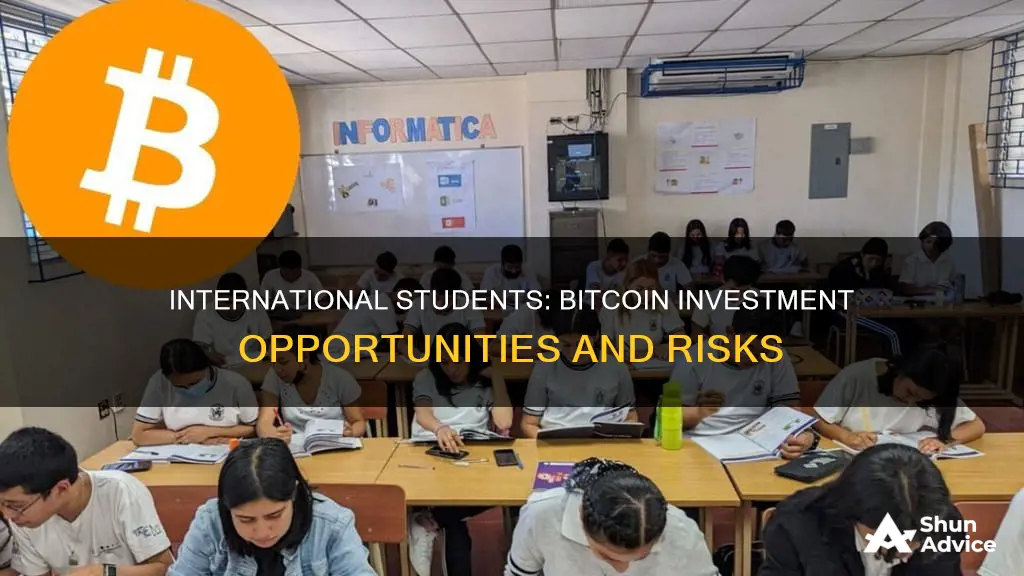
International students on F-1 visas in the United States are generally allowed to invest in stocks and cryptocurrencies, including Bitcoin. However, they must comply with the same laws and regulations that apply to US citizens, and may be subject to certain tax and reporting requirements. While visa holders can buy and sell cryptocurrencies without legal repercussions, they must report their earnings to the IRS as profits from Bitcoin trading are classified as capital gains.
| Characteristics | Values |
|---|---|
| Can international students on an F1 visa invest in Bitcoin? | Yes, international students on an F1 visa can invest in Bitcoin. |
| Can international students on other visas invest in Bitcoin? | Yes, international students on other visas such as F2, M1, J1, H1B, L1, OPT, or refugee status can also invest in Bitcoin. |
| Are there any legal repercussions for international students investing in Bitcoin? | No, there are no legal repercussions for international students investing in Bitcoin in the U.S., as long as they comply with relevant laws and regulations. |
| Do international students have to pay taxes on Bitcoin profits? | Yes, international students are subject to U.S. taxation on any profits made from trading Bitcoin and must report these transactions in their tax filings. |
| Are there any immigration issues to consider? | Investing in and trading Bitcoin is typically not an issue that affects student visa status, as long as it is not considered employment or business operations, and the primary purpose of the student's stay remains education. |
| Are there any risks associated with investing in Bitcoin? | Yes, Bitcoin and other cryptocurrencies are volatile and carry risks. Students should research and understand these risks before investing. |
What You'll Learn
- International students on F1 visas can invest in Bitcoin
- International students need to comply with their home country's foreign exchange regulations
- International students must adhere to US tax laws when trading Bitcoin
- International students may face additional restrictions and regulations when day trading
- International students should consult with a financial advisor or tax professional

International students on F1 visas can invest in Bitcoin
There are no laws that prevent F1 visa students from investing in the stock market. However, it is important to remember that, as an F1 visa holder, you are a full-time student and must maintain your student status by enrolling in the required course credits and remaining in good academic standing. Investing in the stock market is acceptable as long as it is not done as a full-time activity.
International students on F1 visas who are interested in investing in Bitcoin or other cryptocurrencies should be aware of certain tax and reporting requirements related to their investments. For example, foreign nationals are subject to a 30% tax on any stock-related capital gains. Additionally, a Social Security Number (SSN) or an Individual Taxpayer Identification Number (ITIN) may be required to trade cryptocurrencies on certain platforms.
Before investing in Bitcoin or other cryptocurrencies, international students on F1 visas should consult with a financial advisor or tax professional to understand their rights and obligations under U.S. law. Additionally, seeking advice from an immigration attorney can help ensure that their investment activities do not violate the terms of their visa.
Dogecoin on Robinhood: How to Invest and Trade
You may want to see also

International students need to comply with their home country's foreign exchange regulations
International students can invest in Bitcoin and other cryptocurrencies. However, they must ensure that they comply with their home country's foreign exchange regulations and the regulations of the country they are studying in. For example, international students in the United States on an F-1 visa are allowed to invest in cryptocurrencies but must follow the same laws and regulations as U.S. citizens. This includes registering with the SEC, complying with tax requirements, and adhering to rules related to insider trading.
It is important to note that the regulations for international students investing in cryptocurrencies can vary depending on their visa status and the country they are studying in. Therefore, international students should consult with a financial advisor, tax professional, or immigration attorney to understand the specific regulations and restrictions that apply to their situation.
In terms of foreign exchange regulations, international students should be aware of the following:
- Compliance with Host Country Regulations: International students must comply with the laws and regulations of the country they are studying in. This includes adhering to any restrictions on financial activities, such as those imposed by the U.S. Securities and Exchange Commission (SEC) for F-1 visa holders in the United States.
- Tax Requirements: International students may be subject to tax obligations in their home country or the country of their residence during their studies. For example, profits from Bitcoin trading are typically classified as capital gains and are taxable in the country of residency.
- Reporting Requirements: In addition to tax requirements, international students may have reporting obligations related to their investments. This could include disclosing their investments to the appropriate authorities in their home country or country of residence.
- Restrictions on Currency Exchange: Some countries may have restrictions on the amount of currency that can be exchanged or transferred internationally. International students should be aware of any such restrictions imposed by their home country or the country they are studying in.
- Anti-Money Laundering and Counter-Terrorism Financing Regulations: International students should ensure that they comply with any anti-money laundering and counter-terrorism financing regulations in their home country and country of residence. This includes understanding the source of funds used for investing and ensuring that they do not engage in any prohibited activities.
- Foreign Exchange Controls: Some countries may have controls in place that restrict the purchase or sale of foreign currencies, including cryptocurrencies. International students should be aware of any such controls imposed by their home country and the potential impact on their ability to invest.
By complying with the relevant foreign exchange regulations, international students can ensure that they are meeting their legal obligations and managing their financial activities appropriately while studying abroad. It is important to seek professional advice and stay informed about any changes in regulations to avoid penalties or violations.
The Bitcoin Millionaires: Fortunes of the Crypto Investors
You may want to see also

International students must adhere to US tax laws when trading Bitcoin
International students in the US on an F1 visa are permitted to invest in cryptocurrencies such as Bitcoin. However, they must adhere to US tax laws and may be subject to certain tax and reporting requirements.
The US government collects taxes from crypto traders, and profits from Bitcoin and other cryptocurrencies are taxed in the trader's country of residence. For US tax purposes, digital assets like Bitcoin are considered property, not currency. This means that any income from Bitcoin trading is taxable and must be reported on tax returns.
To facilitate their trading, international students may need to obtain a Social Security Number (SSN) or an Individual Taxpayer Identification Number (ITIN). These are typically required by trading platforms and exchange sites. While buying and selling cryptos is not considered a profession, international students must ensure that their trading activities do not interfere with their full-time student status and visa requirements.
It is important for international students to consult with a financial advisor, tax professional, or immigration attorney to understand their rights and obligations under US law and to ensure they are compliant with tax regulations when trading Bitcoin.
Explore Blockchain Investment: Beyond Bitcoin Buying
You may want to see also

International students may face additional restrictions and regulations when day trading
International students on an F-1 visa in the United States are generally allowed to invest in stocks and cryptocurrencies. However, they are subject to certain restrictions and regulations, and day trading may carry additional challenges.
International students are allowed to buy and sell stocks and other securities, provided they comply with the same laws and regulations as U.S. citizens. This includes registering with the SEC if necessary and adhering to rules regarding insider trading and market manipulation.
Similarly, international students can legally invest in cryptocurrencies like Bitcoin. They must, however, comply with tax and reporting requirements related to their investments. Profits from trading are considered capital gains and are subject to U.S. taxation laws. It is important to report these transactions in tax filings to avoid complications with the IRS.
Day trading involves buying and selling stocks or other securities multiple times a day to profit from short-term price changes. This practice is subject to various rules and regulations, such as minimum equity requirements and limits on the number of trades within a given period. Due to the risky nature of day trading, international students may face additional restrictions and regulations when engaging in this activity.
Before engaging in day trading, international students should consult a financial advisor or tax professional to understand their rights and obligations under U.S. law. Additionally, seeking advice from an immigration attorney can help ensure their activities do not violate their visa terms. It is crucial to remember that their primary purpose in the U.S. should remain education, and their financial activities should not be considered employment or business operations, which are typically restricted under student visa regulations.
The Ultimate Guide to Investing in Bitcoin
You may want to see also

International students should consult with a financial advisor or tax professional
International students on an F-1 visa in the United States are permitted to invest in stocks and cryptocurrencies such as Bitcoin. However, it is important to consult with a financial advisor or tax professional to understand the specific tax and reporting requirements associated with their investments. While investing is allowed, international students must ensure that their activities do not violate the terms of their visa. For instance, their primary purpose in the U.S. should remain education, and their financial activities should not be considered employment or business operations, which are typically restricted under student visa regulations.
When it comes to investing in cryptocurrencies, international students should be aware of the applicable tax laws. Any profits made from trading cryptocurrencies are subject to U.S. taxation, and these transactions must be reported in their tax filings. Failure to comply with tax requirements can lead to issues with the IRS. Therefore, it is essential for international students to keep detailed records of their financial transactions, including cryptocurrency trades, to avoid any complications.
Additionally, international students should be mindful of the regulations in their home country regarding foreign currency transactions and capital outflows when transferring funds to invest. Compliance with both the laws of their host country and their home country is essential to avoid legal repercussions. Given the complexity of tax laws and immigration rules, consulting a financial advisor or tax professional is highly recommended to ensure that international students stay compliant with all relevant laws and regulations.
Furthermore, it is crucial for international students to understand the risks associated with investing in cryptocurrencies. While it offers the prospect of quick profits, the cryptocurrency market is highly volatile and subject to significant price fluctuations. Students should conduct thorough research and due diligence before investing, understanding the patterns, risks, and regulations involved. By seeking professional advice, international students can make informed decisions about investing in cryptocurrencies while ensuring compliance with the laws of their host country and maintaining their visa status.
Investing $1000 in Bitcoin: Is It Worth It?
You may want to see also







